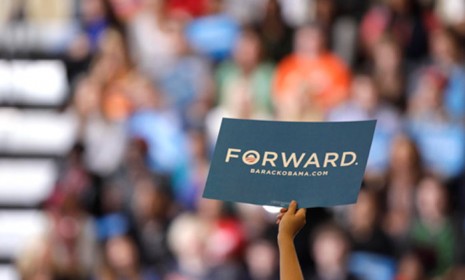Team Obama knows too much
The future of Big Data is now


A free daily email with the biggest news stories of the day – and the best features from TheWeek.com
You are now subscribed
Your newsletter sign-up was successful
Apparently, there are 106,875 people named Marc who regularly show up to vote.
I know this because the Obama campaign, in an email to me last night, told me so. They're bragging!
How, you might ask, does the Obama campaign know this? The voter rolls they get are clean and updated regularly, but it turns out that they know a lot more about things.
The Week
Escape your echo chamber. Get the facts behind the news, plus analysis from multiple perspectives.

Sign up for The Week's Free Newsletters
From our morning news briefing to a weekly Good News Newsletter, get the best of The Week delivered directly to your inbox.
From our morning news briefing to a weekly Good News Newsletter, get the best of The Week delivered directly to your inbox.
They know if you're registered to vote or not. They know, because of the magazines you subscribe to, what you like to do in your spare time. They know, because of their Facebook friends, the types of people you associate with. Me: I am not a volunteer for the campaign. But they know how much money I make. They know my age. They know how long it takes me to open an email they send to me. They know which words are likely to make me open an email more quickly. They know what images make me click on a link more quickly. They're able to associate my name with my public online identities and make predictions about my behavior based on keywords they mine from the data.
Somewhere in Chicago, and elsewhere in a secret data center, a computer has come up with a score that projects the likelihood that I will vote for Obama. This number will help the campaign figure out how much of its finite resource store it needs to devote to getting me to the polls. The fact that I live in California means that I probably will not get a lot of personal attention from Team Obama. If I lived in Florida, I'd be getting regular contacts. The campaign will have figured out what types of people are more likely to get me to make a decision; they consciously and deliberately aim to manipulate me.
The Romney campaign is doing the same thing, but the scale is much smaller. Obama's 2008 campaign incorporated a lot of psychographic targeting, but voters weren't individuated as targets the way they are this cycle. The scope of the operation boggles the mind. It raises a lot of weird questions about free will and cognitive science. It is not the future of campaigning; it is the way that campaigns will be run from now until something else comes along and allows a campaign to directly target the synapses in my brain that potentiate when I think of voting for someone.
A free daily email with the biggest news stories of the day – and the best features from TheWeek.com
Marc Ambinder is TheWeek.com's editor-at-large. He is the author, with D.B. Grady, of The Command and Deep State: Inside the Government Secrecy Industry. Marc is also a contributing editor for The Atlantic and GQ. Formerly, he served as White House correspondent for National Journal, chief political consultant for CBS News, and politics editor at The Atlantic. Marc is a 2001 graduate of Harvard. He is married to Michael Park, a corporate strategy consultant, and lives in Los Angeles.
-
 6 of the world’s most accessible destinations
6 of the world’s most accessible destinationsThe Week Recommends Experience all of Berlin, Singapore and Sydney
-
 How the FCC’s ‘equal time’ rule works
How the FCC’s ‘equal time’ rule worksIn the Spotlight The law is at the heart of the Colbert-CBS conflict
-
 What is the endgame in the DHS shutdown?
What is the endgame in the DHS shutdown?Today’s Big Question Democrats want to rein in ICE’s immigration crackdown
-
 The billionaires’ wealth tax: a catastrophe for California?
The billionaires’ wealth tax: a catastrophe for California?Talking Point Peter Thiel and Larry Page preparing to change state residency
-
 Bari Weiss’ ‘60 Minutes’ scandal is about more than one report
Bari Weiss’ ‘60 Minutes’ scandal is about more than one reportIN THE SPOTLIGHT By blocking an approved segment on a controversial prison holding US deportees in El Salvador, the editor-in-chief of CBS News has become the main story
-
 Has Zohran Mamdani shown the Democrats how to win again?
Has Zohran Mamdani shown the Democrats how to win again?Today’s Big Question New York City mayoral election touted as victory for left-wing populists but moderate centrist wins elsewhere present more complex path for Democratic Party
-
 Millions turn out for anti-Trump ‘No Kings’ rallies
Millions turn out for anti-Trump ‘No Kings’ ralliesSpeed Read An estimated 7 million people participated, 2 million more than at the first ‘No Kings’ protest in June
-
 Ghislaine Maxwell: angling for a Trump pardon
Ghislaine Maxwell: angling for a Trump pardonTalking Point Convicted sex trafficker's testimony could shed new light on president's links to Jeffrey Epstein
-
 The last words and final moments of 40 presidents
The last words and final moments of 40 presidentsThe Explainer Some are eloquent quotes worthy of the holders of the highest office in the nation, and others... aren't
-
 The JFK files: the truth at last?
The JFK files: the truth at last?In The Spotlight More than 64,000 previously classified documents relating the 1963 assassination of John F. Kennedy have been released by the Trump administration
-
 'Seriously, not literally': how should the world take Donald Trump?
'Seriously, not literally': how should the world take Donald Trump?Today's big question White House rhetoric and reality look likely to become increasingly blurred
